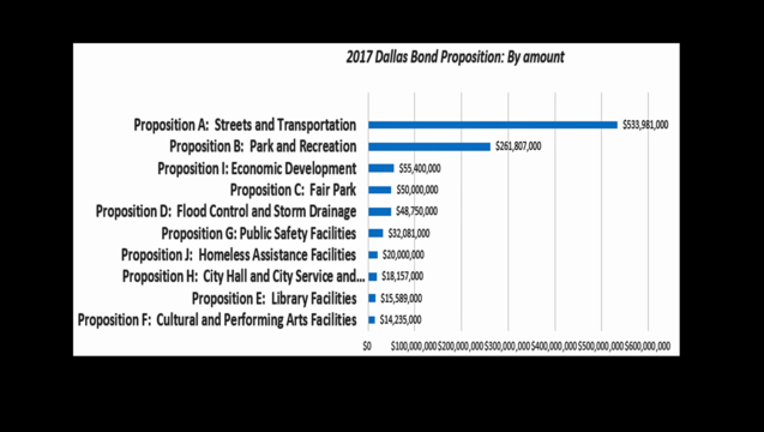2017 Dallas Bond: Explained and Broken Down

Dallas voters will need to decide on 10 different bond propositions that add up to $1.05 billion.
Here is a breakdown of where the money would go, in order from the largest proposition, streets, to the smallest, cultural and performing arts facility upgrades.
Streets and Transportation: $533,981,000 Proposition A
While many Dallas streets are so rundown that they double as speed bumps, turns out a half-billion dollars, is only a drop in the bucket, compared with what is really needed.
Assistant City Manager Majed Al-Ghafry says repairing all of the city’s streets would really take $5.5 billion dollars.
When asked if the bond proposition is like trying to plug a fire hose with a finger, he said, sort of.
“It's tightening it with a bad knot, planning to have a plan for a replacement of that knot,” Al-Ghafry said. I want to create not just a maintenance plan but a preventative plan.”
The money would also help the city improve traffic signals, which he says would translate into less time spent at stoplights.
Parks and Recreation: $ 261,807,000 Proposition B
This money would go toward 163 park projects around Dallas.
Some of the big projects:
$35 Million to re-develop and develop three downtown parks: Carpenter Park, Harwood, and the West End Plaza.
$20 Million in matching funding for the Trinity Forest Spine Trail, Trinity Skyline Trail Link, Baker Pump Station Gateway, and Circuit Trail Connection
$10 Million to create new features and playgrounds in Klyde Warren Park.
$7.1 Million in match funding for a deck park like Klyde Warren Park at I-35 and Ewing, near the zoo.
And millions more toward aquatic centers, and other trails.
Economic Development: $55,400,000 Proposition I
This is a bit of a vague one.
There are no specific defined projects.
The money is allocated for creating mixed-income housing and transit oriented development, and revitalizing distressed areas.
“It has been demonstrated in the past,” Al-Ghafry said. “Great economic development projects have come to fruition; a great example is the Farmer's Market that you see now.”
Fair Park: $50,000,000 Proposition C
This is money that would go to fix up the 12 dilapidated historic art deco buildings at Fair Park. They were built in 1936 for the Texas Centennial, but it’s been said they won’t make it to the bicentennial if nothing is done. The city is in the process of getting a private management company to oversee Fair Park and turn it into a year round destination, an idea that’s been talked about for decades.
Flood Control: $48,750,000 Proposition D
This would go toward flood and erosion control projects throughout Dallas neighborhoods.
Public Safety Facilities: $32,081,000 Proposition G
More than two years after a man opened fire on Dallas Police Headquarters, police officers are still waiting for safety improvements.
This bond proposition would deliver $1.25 million for security upgrades at police headquarters, and at least $750,000 in upgrades at 5 other city substations.
It would also replace two fire stations, and provide funding to build a new fire station.
Housing for the Homeless: $20,000,000 Proposition J
The new strategy to solve homelessness making its way around the country is to provide homes for the homeless, no strings attached.
The city is not listing any specific locations for a new homeless housing facility, but would rather use the money to create permanent housing for the homeless that would be scattered around the city.
City Hall Facility Improvements: $18,157,000 Proposition H
City Hall was built in 1978 and it needs some restroom upgrades, and a new roof, so says the bond proposition spreadsheet. Other city facilities would receive upgrades as well.
Library Facilities: $15,589,000 Proposition E
The Vickery Meadow neighborhood would get a new $7.7 million library.
The Greenville Avenue Forest Green Library would be rebuilt for $7.79 million.
Cultural Performing Arts Facilities: $14,235,000
Meyerson Symphony Center would get $3.8 Million for a new roof and other building upgrades.
The Dallas Museum of Art and other cultural centers would get facility upgrades.
The bottom line
Who pays for all of this? Dallas taxpayers. However, the city promises that the tax rate will not go up on account of the bond package. However, your tax bill will go up as property values continue to rise, and that's how this is paid for.
We asked what happens if there is an economic downturn. Al-Ghafry says a city usually doesn’t issue the bonds all at once. So if tax revenue was predicted to go down, the city could hold off on issuing bonds that year.
Here is a complete breakdown of every project in the bond:

